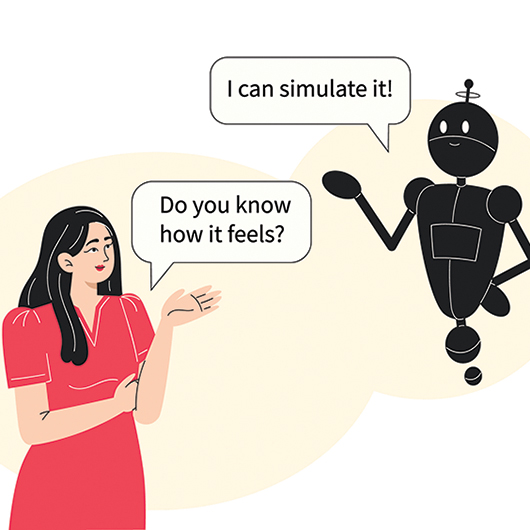 Must-have skills for
Must-have skills for
the new world of work
There is no doubt that AI will replace humans. Humans who understand
how to leverage AI’s strengths and weaknesses and effectively position themselves will replace humans who don’t.
By Kimberly Paterson, CEC
Work is changing. If you’re not feeling the direct impact yet, you will. Consider what experts who study the future are saying. Futurist Ray Kurzweil predicts, “Rather than experiencing 100 years of progress in the 21st century, we’ll witness the order of 20,000 years of progress.” According to John Seely Brown, former Xerox chief scientist, “Fifteen years ago, a skill like computer language, best practices in data analytics lasted about five years. Today it is closer to 18 months.” As a result, we can expect to rebuild our careers from ground zero, not once or twice, but many times throughout our professional lives.
Successful professionals will continually focus on their development to ensure that their skills keep pace with the rate of change.
Recognizing the power of AI
“With AI, one individual will be able to do the work of three or four,” forecasts Deborah Perry Piscione in her book Employment is Dead: How Disruptive Technologies are Revolutionizing the Way We Work. The impact on jobs will be monumental. McKinsey Global Institute projects that by “2030, 80% of us will see job replacement or wage reduction due to technology.”
Even in these early stages, AI is more skilled at detecting cancerous cells in mammograms than seasoned radiologists. AI stands to impact every professional in some way. Insurance is no exception. Insurers currently using AI are finding that it is identifying underlying risk patterns missed by skilled underwriters. At the brokerage level, AI promises to dominate functions like analyzing coverage needs and program/policy options, developing proposals, matching carrier appetites and client risk profiles, rating, tracking submissions, and designing highly tailored client sales campaigns.
There is no doubt that AI will replace humans. Humans who understand how to leverage AI’s strengths and weaknesses and effectively position themselves will replace humans who don’t.
Honing your edge in an AI-driven economy
As AI assumes more of the processing, information gathering, analysis, and routine service work, the human qualities that aren’t effectively replicated by machines will be the most valuable currency in the workplace.
Let’s say your job is business development, and you consistently win business because of your superior technical knowledge and ability to find gaps in prospective clients’ programs. Access to AI tools is quickly leveling that playing field and jeopardizing your competitive advantage. Future-proofing your success means spending less time sharpening your technical capabilities and more time building your human-centric skills.
While not yet fully proficient, machines can and will answer your client’s technical questions and frame the pros and cons of their choices. Only a human being can make them feel understood, secure, valued and respected—in short, someone they can trust with their financial security.
Our value as humans is no longer a philosophical question. It’s become the practical career consideration of our time. It is no coincidence that the majority of skills that professionals will need to master are based on the qualities that are unique to humans.
- Prospection. This is the ability to consider possibilities, anticipate and plan for the future. Due to the way our brains have evolved, humans naturally possess the common sense and intuitive reasoning that allows them to make predictions. Humans can imagine future events and project themselves into potential situations and see how they might unfold. They can build future scenarios from past experiences and use these memories to create new, imagined situations.
Prospection enables individuals to determine desired achievements, set goals, and make plans to reach them. AI functions by identifying and replicating patterns and correlations within data, but it doesn’t have humans’ understanding of the meaning and context behind that data. Its lack of context and common sense are barriers to considering unexpected events or situations that deviate from its training data.
.

- Resilience. Individuals with higher levels of resilience have the skills and mindset to navigate change more effectively than those with lower resilience. They bounce back quickly because they see difficult situations as temporary and are confident in their ability to manage setbacks and obstacles. Their growth mindset enables them to view challenge and failure as learning opportunities.
Resilient people are skilled at managing their emotions. They have healthy ways of coping with stress and know how to regulate their emotional responses to people and situations.
- Adaptability. Humans are uniquely wired to adapt. Survival of any species depends on it. The pace and level of change we’re experiencing demand a higher level of adaptability than ever. Roles, responsibilities and expectations will continuously shift and evolve.
- Professionals who will thrive are those who build a broad range of skills, are open to new perspectives and ways of thinking, and are adept at performing amidst uncertainty. People who require total clarity before acting and struggle to contribute beyond their specific description will be left behind.
- Social connection. As humans, we’re meant to connect with one another.
Research consistently shows that connection is vital to our physical health, emotional well-being and ability to cope in the work world with critical interdependencies and a need for cross-collaboration. At the same time, remote work, increased reliance on technology, perceived “time famine,” and a lack of social and communication skills among Gen Zers are significant barriers to connection.
AI cannot create deep, genuine connection. Only humans can feel, care and create the sense of belonging that humans crave. A critical skill for the future is the ability to break through obstacles and quickly form connections and build trust with people who have different life experiences, beliefs and values. - Emotional intelligence. AI may be able to simulate empathy, but it lacks the emotional intelligence to understand unspoken human dynamics and navigate the complex range of human emotions. People with emotional intelligence can read the environment in a way that machines can’t, making it a distinguishing and relevant skill for professionals.
- Big picture thinking. AI can execute solutions to individual aspects of a problem, but it can’t connect different concepts and ideas. It relies on humans and the right prompts to do that. Humans have the unique ability to see a problem in its entirety and how the pieces of the puzzle come together. Their broader perspective gives them a deeper understanding of a situation and thus the ability to make better decisions.
- Leadership. AI can optimize goals, but it can’t create an inspiring vision that compels others to follow. That is a uniquely human quality. While AI can provide helpful information on leading a team, it lacks the ability to listen and understand people and nurture their development. It can’t grasp and manage complex team dynamics, adapt to the team’s rhythm and build on the synergy of collective strengths and weaknesses.
- Originality. AI can deal only with inputted data. While it may be able to imitate creative thinking or problem solving, at best, it’s a variation of what’s been tried and tested. Only the human imagination has the capacity to explore the unknown, which is the driving force behind innovation.
- Intuition. AI can process more data than humans, but it can’t match years of lived experience or contemplate the broader implications of decisions. The most valued people in organizations won’t be those with the most facts. It will be leaders with the wisdom and gut-level instincts to separate the noise from what’s important, to see opportunities before they materialize in the data and the ability to make vital decisions in the face of uncertainty.
Soft skills at a premium
Once considered “nice to have,” soft skills are becoming essential. Hard skills like accounting, underwriting and programing, will still play a role in the hiring process, but soft skills such as emotional intelligence, leadership and problem solving are what will enable professionals to advance in their careers and thrive in a fast-changing environment.
The challenge is that people with soft skills are in short supply. Unlike hard skills, soft skills are rarely taught in colleges and universities or are part of licensing and industry certifications. Professionals are expected to develop these skills independently. The deficit among younger professionals is significant due to less face-to-face interaction and more digital communication.
Preparing for the change ahead will require leaders who can help their teams get excited about AI’s transformative capabilities rather than seeing it as a threat. A critical part of the transition will be helping workers see the opportunity in how roles are changing and supporting them in building the human-centric skills they need to be confident and remain integral parts of the business’s future success.
The author
Kimberly Paterson, Certified Executive Coach and Master Energy Leadership Coach, is president of CIM (www.cim-co.com). CIM works with organizations and individuals to maximize performance through positive lasting behavioral change. Her clients are property and casualty insurance companies, agencies and brokers. She can be reached at kpaterson@cim-co.com. Follow Kimberly on www.linkedin.com/in/kimberly-paterson.




